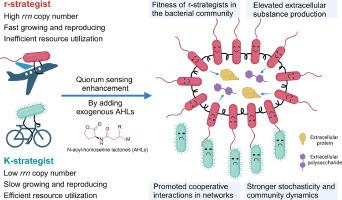当前位置:
X-MOL 学术
›
Water Res.
›
论文详情
Our official English website, www.x-mol.net, welcomes your feedback! (Note: you will need to create a separate account there.)
Enhanced AHL-mediated quorum sensing accelerates the start-up of biofilm reactors by elevating the fitness of fast-growing bacteria in sludge and biofilm communities
Water Research ( IF 12.8 ) Pub Date : 2024-04-30 , DOI: 10.1016/j.watres.2024.121697 Fuzhong Xiong , Tianjiao Dai , Yuhan Zheng , Donghui Wen , Qilin Li
Water Research ( IF 12.8 ) Pub Date : 2024-04-30 , DOI: 10.1016/j.watres.2024.121697 Fuzhong Xiong , Tianjiao Dai , Yuhan Zheng , Donghui Wen , Qilin Li

|
Quorum sensing (QS)-based manipulations emerge as a promising solution for biofilm reactors to overcome challenges from inefficient biofilm formation and lengthy start-ups. However, the ecological mechanisms underlying how QS regulates microbial behaviors and community assembly remain elusive. Herein, by introducing different levels of N-acyl-homoserine lactones, we manipulated the strength of QS during the start-up of moving bed biofilm reactors and compared the dynamics of bacterial communities. We found that enhanced QS elevated the fitness of fast-growing bacteria with high ribosomal RNA operon () copy numbers in their genomes in both the sludge and biofilm communities. This led to notably increased extracellular substance production, as evidenced by strong positive correlations between community-level copy numbers and extracellular proteins and polysaccharides (Pearson's r = 0.529−0.830, < 0.001). Network analyses demonstrated that enhanced QS significantly promoted the ecological interactions among taxa, particularly cooperative interactions. Bacterial taxa with higher network degrees were more strongly correlated with extracellular substances, suggesting their crucial roles as public goods in regulating bacterial interactions and shaping network structures. However, the assembly of more cooperative communities in QS-enhanced reactors came at the cost of decreased network stability and modularity. Null model and dissimilarity-overlap curve analysis revealed that enhanced QS strengthened stochastic processes in community assembly and rendered the universal population dynamics more convergent. Additionally, these shaping effects were consistent for both the sludge and biofilm communities, underpinning the planktonic-to-biofilm transition. This work highlights that QS manipulations efficiently drive community assembly and confer specialized functional traits to communities by recruiting taxa with specific life strategies and regulating interspecific interactions. These ecological insights deepen our understanding of the rules governing microbial societies and provide guidance for managing engineering ecosystems.
中文翻译:

增强型 AHL 介导的群体感应通过提高污泥和生物膜群落中快速生长细菌的适应性来加速生物膜反应器的启动
基于群体感应(QS)的操作成为生物膜反应器的一种有前途的解决方案,可以克服低效生物膜形成和漫长的启动过程带来的挑战。然而,QS 如何调节微生物行为和群落组装的生态机制仍然难以捉摸。在此,通过引入不同水平的N-酰基高丝氨酸内酯,我们在移动床生物膜反应器启动过程中控制QS的强度,并比较细菌群落的动态。我们发现,增强的 QS 提高了污泥和生物膜群落中基因组中具有高核糖体 RNA 操纵子 () 拷贝数的快速生长细菌的适应性。这导致细胞外物质的产生显着增加,群落水平拷贝数与细胞外蛋白和多糖之间的强正相关性证明了这一点(Pearson's r = 0.529−0.830,< 0.001)。网络分析表明,增强的QS显着促进了类群之间的生态相互作用,特别是合作相互作用。具有较高网络度的细菌类群与细胞外物质的相关性更强,这表明它们作为公共物品在调节细菌相互作用和塑造网络结构方面发挥着至关重要的作用。然而,在 QS 增强型反应堆中组装更多合作社区的代价是网络稳定性和模块化程度下降。零模型和相异重叠曲线分析表明,增强的QS增强了群落组装的随机过程,并使普遍的种群动态更加收敛。此外,这些塑造效应对于污泥和生物膜群落来说是一致的,支撑着浮游生物到生物膜的转变。这项工作强调,QS 操作通过招募具有特定生活策略的类群和调节种间相互作用,有效地驱动群落组装并赋予群落专门的功能特征。这些生态见解加深了我们对微生物群落规则的理解,并为管理工程生态系统提供了指导。
更新日期:2024-04-30
中文翻译:

增强型 AHL 介导的群体感应通过提高污泥和生物膜群落中快速生长细菌的适应性来加速生物膜反应器的启动
基于群体感应(QS)的操作成为生物膜反应器的一种有前途的解决方案,可以克服低效生物膜形成和漫长的启动过程带来的挑战。然而,QS 如何调节微生物行为和群落组装的生态机制仍然难以捉摸。在此,通过引入不同水平的N-酰基高丝氨酸内酯,我们在移动床生物膜反应器启动过程中控制QS的强度,并比较细菌群落的动态。我们发现,增强的 QS 提高了污泥和生物膜群落中基因组中具有高核糖体 RNA 操纵子 () 拷贝数的快速生长细菌的适应性。这导致细胞外物质的产生显着增加,群落水平拷贝数与细胞外蛋白和多糖之间的强正相关性证明了这一点(Pearson's r = 0.529−0.830,< 0.001)。网络分析表明,增强的QS显着促进了类群之间的生态相互作用,特别是合作相互作用。具有较高网络度的细菌类群与细胞外物质的相关性更强,这表明它们作为公共物品在调节细菌相互作用和塑造网络结构方面发挥着至关重要的作用。然而,在 QS 增强型反应堆中组装更多合作社区的代价是网络稳定性和模块化程度下降。零模型和相异重叠曲线分析表明,增强的QS增强了群落组装的随机过程,并使普遍的种群动态更加收敛。此外,这些塑造效应对于污泥和生物膜群落来说是一致的,支撑着浮游生物到生物膜的转变。这项工作强调,QS 操作通过招募具有特定生活策略的类群和调节种间相互作用,有效地驱动群落组装并赋予群落专门的功能特征。这些生态见解加深了我们对微生物群落规则的理解,并为管理工程生态系统提供了指导。






























 京公网安备 11010802027423号
京公网安备 11010802027423号